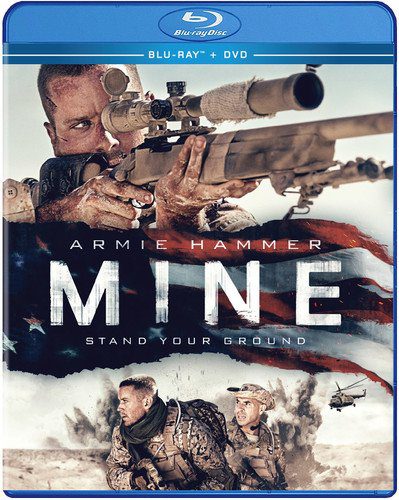
Written by Kristen Lopez
The single-person drama is a genre Hollywood hasn’t unlocked yet. The ultimate in high-concept storytelling, the single-person story requires high stakes and a seamless integration of character development that allows us to care about the character’s success or failure for the established runtime. Mine is the latest in to try to make one person in a high-risk situation compelling and it works on paper. With a sufficiently stressful situation with real-world counterpoints and an intense performance for its lead, Mine settles onto the shakiest ground when it tries to bridge the gap from the professional to the personal.
After a failed assassination attempt, Sergeant Mike Stevens (Armie Hammer) and his partner are left to walk miles in the desert to reunite with base camp. A shortcut through a minefield turns deadly when Mike’s partner is killed and Mike ends up with his foot on a mine. With help 52 hours away, Mike must survive the elements, no food or water, and the chronic fear that one misstep could be his last.
Mine’s greatest influence is Danny Boyle’s 127 Hours (though cutting off a limb doesn’t work in this case). Much like Boyle’s feature, Mine’s protagonist ends up in a situation that causes him to contemplate the life choices he’s made that have led him to this moment. The typical three-act structure of establishing character first through history is reversed, with much of what we learn about Mike’s history coming in the final frames. Situating us at the beginning, all the audience knows is Mike is a career Marine with a girl – with the all-American name of Jenny (Annabelle Wallis being sweet and nothing more) – waiting for him back home. There’s no need for an encyclopedic presentation of a character beforehand, but the rush of information at the end leaves us with a character who seems both underwritten and overwritten at various points and it doesn’t help matters much of the first third of the film leaves Hammer in stoic silence.
Hammer gives as much as the role allows him to perform, intense, frightened, and determined all at once. His tall stature and physicality sell him as a Marine, and he sells the hellish experience his character undergoes. The movie rests firmly on his shoulders, so nearly all the limitations are the result of the situation or the script, as opposed to an issue with his performance. Like James Franco in 127 Hours, Mike is subjected to the lack of food and water, as well as hallucinations. The added ambiguity of mirages in the desert leave some moments to feel truly surprising, though there’s a “been there, done that” feel to dead characters talking to him, and it’s hard not to shake the belief that the screenwriters want to situate this as a “Jesus and the Devil in the desert” situation.
Hammer is left to react appropriately – happy, sad or angry predominantly, given the situation – and does so admirably. Too often outside characters tell us what we should know about Mike and there are snippets illustrating that what they say is true. He’s described as a “bad boy” with a temper, though the one scene of him being violent is played as a moment that introduces him to his girlfriend. Later that violence manifests negatively, but you have to wonder if his girlfriend didn’t see that as an issue that would come up later in their relationship. The relationship elements with Wallis are the weakest and worst-written of the movie. It’s best to add a romance in small bursts since Mike’s life and death situation is A) more compelling and B) already garnering our sympathy. The flashbacks to their relationship are so standard and written in gooey romantic platitudes you’d find in a schoolyard crush. It’s just hard to believe a grown man would say some of the twee things that are meant to be romantic.
Moreso than previous single person dramas, Fabio Guaglione and Fabio Resinaro’s screenplay places emphasis on destiny and fate, mostly reiterated by a kind-hearted Berber (Clint Dyer) who pops up bearing water at certain points. Metaphors are worthwhile, but Mine relies on them far too heavily, inserting them at every turn. It often seems like the script is apologizing for the simplistic narrative by giving it a near omnipotent message. Active minefields are a real-world issue, particularly in war-torn regions and the script takes its time to develop and tell the story in a way that never deflects from Mike’s own situation. Dyer’s character is intriguing, mainly because he seems conjured from the sands. Talking in riddles for much of the runtime, he represents the countless citizens of these Middle Eastern countries who learn to navigate landmines as best they can. However, regardless of how light their step is, these are the victims we too often forget about.
Mine is Locke on a VOD budget, and that’s to say it’s compelling on paper but suffers in execution. Had the script found a sharper way of balancing the personal flashbacks with the current situation – instead of dumping things in the end – it could have been tighter. It’s a fine single person thriller that won’t stick in the brain for long, but is entertaining in the moment.